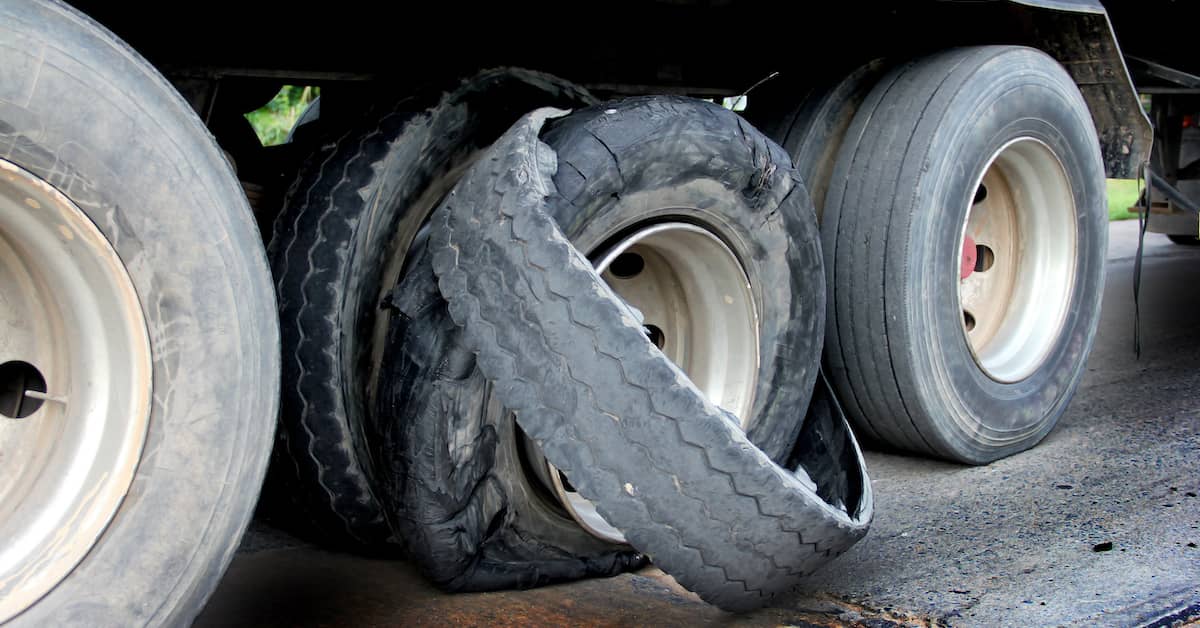
Wisconsin, like the rest of the nation, relies heavily on large commercial trucks to transport freight. Fully loaded trucks can weigh 80,000 pounds; when an 18-wheeler has a tire blowout on the road, the results can be devastating.
A tire blowout occurs when tires rapidly lose air. This causes the driver to lose control, putting the vehicle at high risk for a collision or rollover and drivers and passengers at risk for serious, life-altering injuries.
Tire blowouts are unfortunately common on America’s roads. Most of the rubber shreds and tire remnants that litter American highways are due to blowouts from commercial motor vehicles. According to the Federal Motor Carrier Safety Administration (FMCSA), tire blowouts affect approximately 8,000 commercial trucks every year, many of them causing injuries and fatalities, not to mention property damage.
The knowledgeable truck accident lawyers at Studinski Law, LLC have helped clients in Plover, Marshfield, and all areas across Wisconsin for years. We have extensive experience in these complex cases and we are committed to helping our clients pursue the justice and compensation they deserve after a wreck.
Truck tire blowouts are not simply flat tires. They are extremely dangerous events that jeopardize the safety of both truck drivers and those with whom they share the road. Not only can a tire blowout cause a big rig to careen out of control and crash into other vehicles, but the flying scraps of blown-out tires can also threaten the lives of other drivers, passengers, and pedestrians.
When a truck tire blows out, it can cause immediate safety threats, such as:
In a trucking tire blowout, the force of the explosion, combined with the trailer’s instability when balancing on suddenly uneven tires, often causes truckers to swerve and lose control. This loss of control can cause the truck to collide with other vehicles or even tip over.
Tire blowouts are often accompanied by small chunks of rubber flying in every direction. This is caused by the force of the explosion ripping the tire apart, sending tire debris flying dangerously in the road. When other vehicles and pedestrians are in the path of the flying tire fragments, the results can be catastrophic, and even fatal.
In the chaotic swerving that often follows a truck tire blowout, the rig’s trailer may sway dangerously, disrupting the cargo inside. This can throw off the trailer’s balance, leading to a possible rollover, or cause the back doors to open and release the cargo on the road, creating potentially fatal hazards for other vehicles.
Truck tire blowouts are generally very loud and easily startle other drivers. When the driver of a passenger vehicle sees a large tractor-trailer veer out of control, he or she may panic and aggressively brake, swerve, or speed up, adding increased risk and chaos to the already dangerous situation.
The scene of an accident can be chaotic and overwhelming, especially for victims of a truck accident. If a truck tire blowout caused your vehicle to be struck by a truck tire, consider the following steps:
The first thing you should do after being hit with tire debris is stay calm. Try not to slam on your brakes or accelerate rapidly. Extreme, erratic maneuvers could cause collisions with other vehicles and exacerbate the situation.
Maintain your vehicle’s speed until it is safe to pull over and come to a complete stop. Turn on your hazard lights to alert other drivers about your vehicle’s status. Depending on the situation, you can also set up cones, reflectors, or other caution flares to warn other drivers and protect the scene.
Once you have safely come to a complete stop, check passengers and yourself for any injuries. Even if you believe no one has suffered serious injuries, it is still a good idea to seek medical care as soon as possible. Many injuries, such as traumatic brain injuries and spinal cord injuries, may not be exhibit immediate symptoms.
Under Wisconsin law, you must contact the police after a wreck that causes $1,000 or more worth of property damage or $200 or more damage to government property. You must also contact the police if a driver, passenger, pedestrian, cyclist, or other person is injured or killed. Failing to contact the police immediately after a crash could impact your personal injury claim later on. It could also lead to a suspension of your driver’s license.
If you are safe, uninjured, and able to do so, document the scene of the accident. Take pictures of injuries, vehicle damage, and the road where the accident occurred, capturing images of any traffic signs or skid marks. Exchange information with the other driver and collect contact information from witnesses.
An experienced truck accident lawyer can handle every aspect of your personal injury claim and allow you to focus on healing. An attorney will investigate the wreck, gather evidence to support your case, and help you pursue the full and fair compensation to which you may be entitled under the law.
A truck tire blowout can be a frightening experience and leave you or someone you love facing serious injuries, high medical bills, and time away from work. Don’t face your injuries alone. A truck accident lawyer at Studinski Law, LLC can help you pursue the justice and compensation you need to move forward.
If you have been hurt or lost a loved one in a truck tire blowout accident, call Studinski Law, LLC today at (715) 343-2850 for a free case review. We proudly serve Plover, Marshfield, and all other Wisconsin areas.
